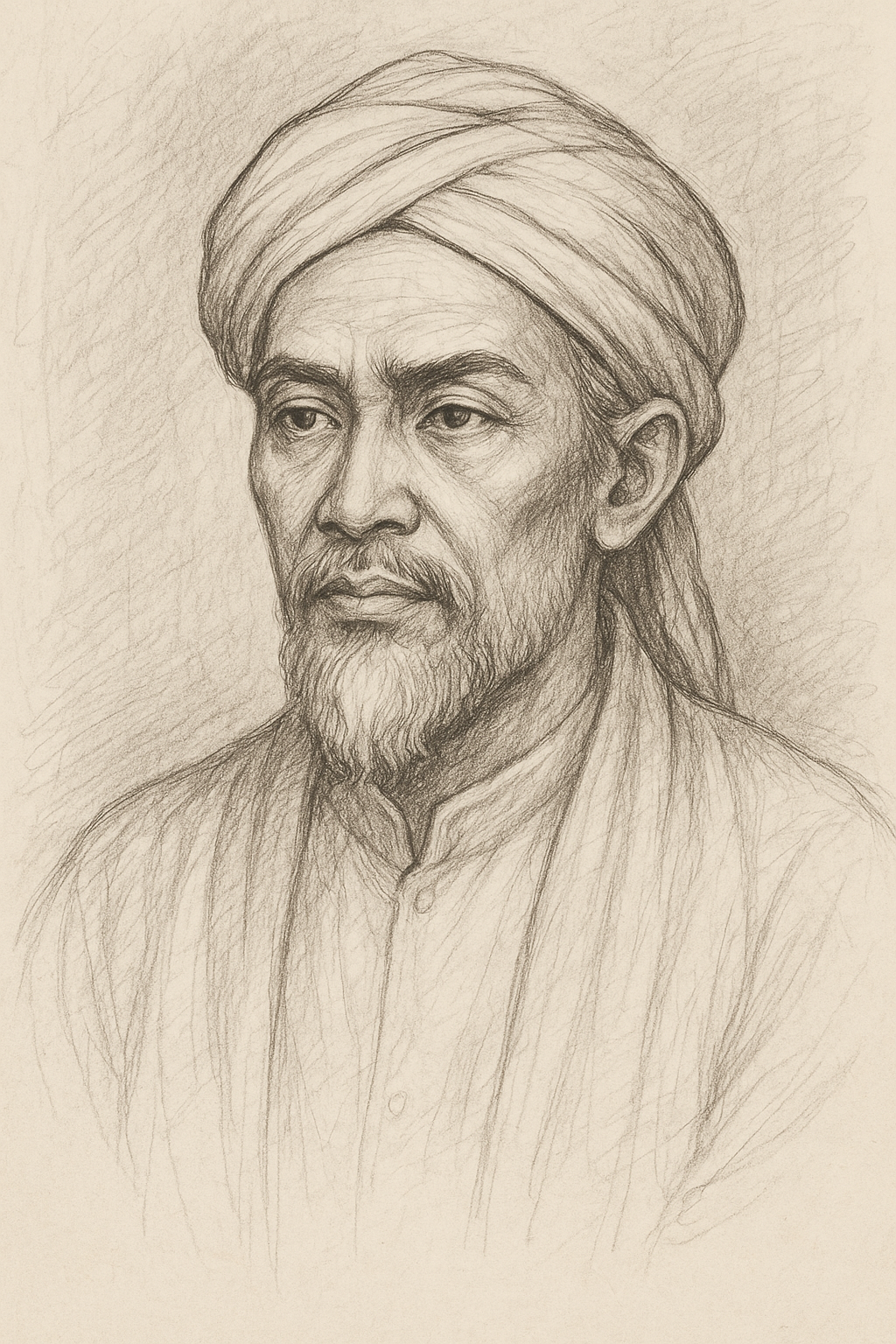Syarif Hidayatullah's Da'wah and Political Thought: a Religious Moderation Perspective
DOI:
https://doi.org/10.53088/jih.v5i1.1430Keywords:
syarif hidayatullah, political da'wah, moderationAbstract
This research analyzes Syarif Hidayatullah's da'wah (preaching) and politics using the concept of religious moderation. This research is a library research with main sources, archives, documents, books, journals, and other related works. The sources are obtained from searches on authoritative websites, such as Delpher, British Library, KITLV, and so on. By applying historical analysis, in the form of source criticism, interpretation and historiography, this research uses a biographical approach and leadership theory. This research shows that Syarif Hidayatullah as a scholar and umara has applied the principle of religious moderation in Cirebon Palace. The religious moderation applied by Syarif Hidayatullah is based on religion-based politics. Where, his political policy succeeded in controlling ritual issues, religious ceremonies, da’wah, and socio-politics. Thus, Syarif Hidayatullah not only succeeded as a politician who expanded the territory, but also succeeded in becoming a role model of religious leaders who prioritize the principle of wasathiyah (moderate).
Keywords: syarif hidayatullah, political da'wah, moderation
REFERENCES
Graff and Th. Pigeaud. Islamic Kingdoms in Java, the Transition from Majapahit to Mataram. Translation of Grafitipers and KITLV, First Cet. Jakarta: Temprint, 1985.
Suprapto, H. M. Bibit. Encyclopedia of Nusantara Ulama: Life History, Works, and History of Struggle of 157 Nusantara Ulama. Jakarta; Gelegar Media Indonesia, 2009
Ibrahim, Tatang. History of Islamic Culture, Madrasah Tsanawiyah for Class IX Semester 1 and 2. Bandung: CV ARMICO, 2009
Azra, Azyumardi. Network of Middle Eastern and Archipelago Scholars in the XVII and XVIII Centuries; Roots of Indonesian Islamic Reform. Bandung: Mizan, 1994
Bekhofer. Jr, Robert F. A Behavioral Approach to Historical Analysis. New York: Free Press, 1971
Tamburakka, Rustam E. Introduction to Historical Science, Philosophical Theory of History, History of Philosophy and Science and Technology Jakarta: PT Rineka Cipta, 1999
Gottschalk, Louis. Understanding History, ed. Nugroho Notosusanto. Yogyakarta: UI Press Publishing Foundation, 1971
Abdurrahman, Dudung. Historical Research Methods. Jakarta: Logos, 1999
Zuhri, Saifuddin. History of Islamic Revival and Its Development in Indonesia. Bandung: P.T. AL-Maarif, second cet. 1980
Sutrisno, Budiono Hadi. History of the Walisongo Mission of Islamization in Java. Yogyakarta: Graha Pustaka, 2009
Kartodirdjo, Sartono. Introduction to New Indonesian History: From Emporium to Empire Volume I. Jakarta: Gramedia, 1987
Ekajati, Edi S. Local History of West Java. Jakarta: Interumas Sejahtera, 1992
Al Qurtuby, Sumanto. Chinese-Islamic-Javanese Currents. Yogyakarta: Inspeal Ahimsakarya Press, 2003
Sunyoto, Agus. Wali Songo: Reconstructing a Dismissed History. Jakarta: Transpustaka, 2011
Tjandrasasmita, Uka. Archaeology of Islam Nusantara. Jakarta: Gramedia Pustaka Utama, 2009
Sunardjo, RH. Unang. A Glimpse into the History of the Kingdom of Cerbon 1479-1809. Bandung: Tarsito, 1983
Bochari, M. Sanggupri and Wiwi Kuswiah. History of the Traditional Kingdom of Cirebon. Jakarta: CV. Suko Rejo Bersinar, 2001
Wildan, Dadan. Syarif Hidayatullah. Ciputat: Salima, 2012
Siti Fauziyah, "The Gait of Sunan Gunung Jati in Building Islamic Political Power in West Java", Tsaqafah, Journal of Religion and Culture, Vol.13 No.1 January-June 2015.
Nindia Farah Islamiati, "The Strategy of Spreading Islam of Sunan Gunung Jati Through the Politics of the Sultanate of Cirebon (1479-1568)", Thesis, Faculty of Ushuluddin, Adab, and Humanities, UIN Prof. KH. Saifuddin Zuhri, Purwokerto, 2023.
Hanif Cahyo Adi Kistoro, "The Relevance of the Value Concept of Sunan Gunung Jati's Petatah Petitih in Islamic Education", Journal of Islamic Religious Education At-Thariqah, Vol.4 No.2, July-December 2019.
Ministry of Religious Affairs of the Republic of Indonesia, Religious Moderation
Eman Suryaman, The Life Path of Sunan Gunung Djati: The Factual History and Leadership Philosophy of a Pandhita-Raja, (Bandung, Marja Publisher, 2015), 96-97.
Agus Iswanto, et al, "Narratives of Religious Moderation in the Manuscript of Serat Carub Kandha," Jurnal Lektur Keagamaan, June 30, 2021.
Kris Nandang and Suciyati Ramdhani, "The Da'wah Path of Sunan Gunung Jati in Cirebon: Building Ethno-Religious Identity and Moderation Values in a Multicultural Society," Sheikh Nurjati: Journal of Social Religion, Vol.02 No.02, 2022.
Achmad Wildan Khoerun Nahar, et al, "The Cultural Concept of Walisongo's Da'wah Strengthens Religious Moderation", Muasarah: Journal of Contemporary Islamic Studies, Vol. 5, No. 2, 2021.
Asep Supriatna, et al, "Methods of Spreading Islam Sunan Gunung Jati in the Perspective of Modern Islamic Education," Edukatif: Journal of Educational Sciences, Volume 3, Number 4, 2021.
Syarifah Aini, et al, "The Role of Sunan Gunung Djati in the Islamization of Mauk District Community, Tangerang Regency," Journal of History Education, Vol.12 No.1 2023.

Downloads
Published
How to Cite
Issue
Section
License
Copyright (c) 2025 Juma'

This work is licensed under a Creative Commons Attribution-ShareAlike 4.0 International License.
Authors who publish with this journal agree to the following terms:
The author(s) retain copyright and grant the journal the right of first publication with the work simultaneously licensed under a CC BY-SA 4.0 license that allows others to remix, adapt, and build upon the work even for commercial purposes, as long as they credit the author(s) and license their new creations under the identical terms.
License details: https://creativecommons.org/licenses/by-sa/4.0/

